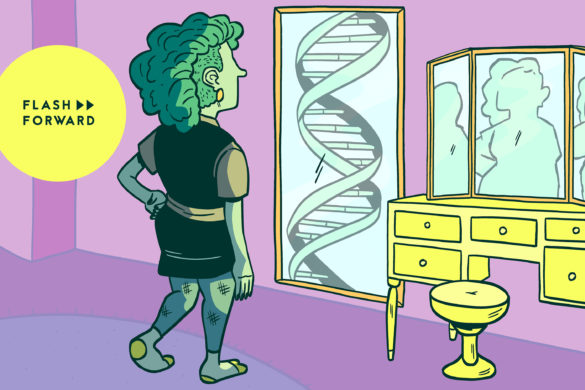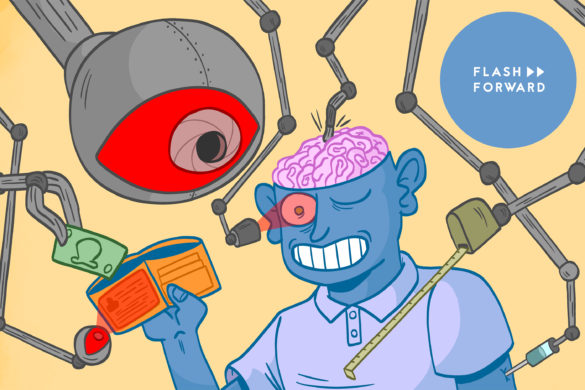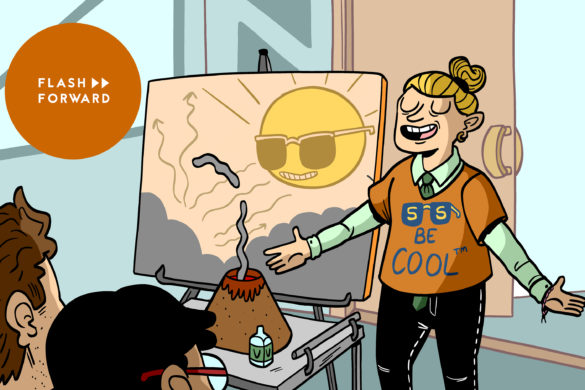Hi again! I’m back with one more of these update episodes. Today we cover the growing “flight shame” movement, some interesting developments in the genetic genealogy space, and what’s going on with the 2020 Census.
New official, legit, Flash Forward episodes begin again on April 14th!
Sources:
- Susanna Elfors: founder, Tagsemester
- Peter Aldhous: reporter, BuzzFeed News
- Hansi Lo Wang: reporter, NPR
Covid-19 Resources
- World Health Organization
- Paywall free articles from The Atlantic
- Flattening the coronavirus curve
- The Covid Tracking Project
✅ ✅ ✅ Take the 2020 Census HERE✅ ✅ ✅
UPDATE #1: Grounded, a future in which all flights are banned
Further reading:
- Airlines’ CO2 emissions rising up to 70% faster than predicted
- ‘Flight Shame’ Comes to the U.S.—Via Greta Thunberg’s Sailboat
- Domestic air travel has dipped as climate-conscious Swedes opt for train. But will ‘flight shame’ become the norm – and what might it mean for business travel?
- Airlines scramble to overcome polluter stigma as ‘flight shame’ movement grows
- Europe’s flight-shame movement has travelers taking trains to save the planet
UPDATE #2: We Are Family, a future where everybody gets genetically tested
Further reading:
- The Genealogy Website That Helped Crack The Golden State Killer Case Has Been Bought By A Forensic Genetics Firm
- A Court Tried To Force Ancestry.com To Open Up Its DNA Database To Police. The Company Said No.
- This DNA Testing Firm Said It Wanted To Bring Closure To Families Of Murder Victims. Then It Blocked A Rival From Using Its Database To Solve Crimes.
- 10 Years Ago, DNA Tests Were The Future Of Medicine. Now They’re A Social Network — And A Data Privacy Mess.
- Northern California judge OKs more DNA tests from alleged Golden State Killer
- Golden State Killer Suspect Offers to Plead Guilty
UPDATE #3: Countless, a future in which the 2020 Census fails
Further reading:
- FILL OUT THE CENSUS HERE
- Coronavirus Forces Bureau To Suspend Census Field Operations Until April 1
- Lawmakers, Advocates Worry Bureau Won’t Fill Half-Million 2020 Census Jobs
- ‘We Are Part Of The United States’: The 1st People Counted For The 2020 Census
- Despite Cybersecurity Risks And Last-Minute Changes, The 2020 Census Goes Online
- Deceased GOP Strategist’s Daughter Makes Files Public That Republicans Wanted Sealed
- The Use of Citizen Voting Age Population in Redistricting (Thomas Hoffeler’s unpublished study)
Full Transcript
Rose: Hello folks! It’s me, Rose, and I’m back in your feeds with one more FLASH BACK TO THE FUTURE update episode before we really get back into the swing of things with the full-on season! Which, again, starts April 14th. People really seemed to like the last one of these, so I’m going to do this one more. This one, and then maybe later on in the year if things happens that I think we should cover.
Obviously I could do an update on the update episode, about novel coronavirus, which now is officially a pandemic and has a name, covid-19. But I’m not going to do that, I’m sure many of you are already drowning in coronavirus news, so I am not going to add to that. I mostly am going to say just a few things about the outbreak, and then we’re going to move on updates about other stuff. .
The first thing I want to say is just to reiterate what Dr. Alexandra Phelan said in our last update episode, which is to just be really mindful of what you’re sharing and making sure that it’s legit, vetted, verified information. Be careful before you share stuff. I know it’s very scary right now, and we’re all trying to kind of thread this impossible needle of taking this seriously and taking precautions, without tipping into abject panic and misinformation. And we all have to do our part to maintain vigilance and calm. Because panic is bad! Panic does not lead to good decision making. Panic leads to hoarding masks which leads to shortages at hospitals. So please channel Hitchhikers Guide to the Galaxy here and Don’t Panic.
I will post a few resources in the show notes here to places I think are doing a good job of covering the pandemic, as well as a link to the World Health Organization’s hub of information on the outbreak. I’ll also post a few resources on why we should all stay home if we can. Flatten the curve! You probably know this by now. If you’re not sure what it means, head to the show notes, and I’ll post a few things that explain it.
One side effect of flattening the curve, and staying inside and social distancing, is that a lot of small businesses are hurting right now, so if you can please think about supporting your local independents business owners. A lot of restaurants sell merch, you can buy a shirt or a hat or a gift card, or buy a mug from a potter, or a painting from an artist, or donate to a Patreon, it’s really dicey for independent creatives and artists and small business owners right now so if you can help, please do.
The last thing I’ll say about the pandemic, is that it’s been really interesting watching how the virus winds up also creating updates on other episodes that aren’t about a global pandemic at all. Mitt Romney recently called for the federal government to give everybody $1,000 to help buffer the impact of the virus. That’s not a UBI and it’s not that much money, but it is significant that it’s Mitt Romney, a former Republican presidential candidate, calling for something like this. And just yesterday, the White House said they were considering giving the most impacted Americans some money. How much, and how it will work, is still up in the air, but still, if you had told me three months ago that the Trump white house would consider even a watered down, kind of, sort of, version of a UBI, I’d probably laugh at you!
The pandemic has also gotten people talking about things like prison reform, which we have talked about on three different episodes over the last few years. In Italy, there have been dozens of riots at prisons, where inmates recognized that the conditions that they’re housed in are basically perfect for spreading a virus like this. A jail in Ohio is currently trying to get permission to release 300 low risk offenders, to reduce the risk of covid-19 from spreading. It’s obviously impossible for inmates to socially distance themselves; they’re often living in tiny cells with a bunch of other people. And according to the Bureau of Labor Statistics, prisoners and jail inmates are more likely than the general population to have chronic conditions. If covid-19 did get into a prison, a lot of people would probably die. And so, people are talking about ways to release people to keep them safe.
Okay, I said I wasn’t going to do too much of an update on coronavirus, and I just talked about it for a while, so let’s move on, shall we? Let’s talk about something else. What we are going to do on today’s episode is revisit three non-pandemic related futures. We’re going to talk about flights, and not flying. We’re going to talk about about genetic testing companies being acquired and fighting with each other. And we’re going to talk about the 2020 census which is happening right now.
The Count: Ah, the census, my favorite time of the decade.
Rosita: Census? What’s that?
The Count: Oh, it is a special time when we count each person in every home, in all the neighborhoods across the country.
Rose: But before we get to counting, let’s talk about flying.
This is a deep cut update; the tenth ever episode of Flash Forward was about a future in which all air travel is banned, not because of a pandemic but because it’s so bad for the climate. At the time the idea seemed totally preposterous, and an actual all around ban is still not going to happen. But, in the last five years there actually has been a growing conversation about flying, and whether we should be doing it, or not. Greta Thunberg, the 17 year old Swedish climate activist, sailed to the United States rather than flying, to make a point about emissions.
And in fact, in Europe, there’s a growing movement with a name. It’s called “flight shame” or “Flygskam” which I’m probably pronouncing incorrectly. And, however you pronounce it, it’s working, in 2019 domestic flights in Sweden were down by 8 percent, and airlines are chalking a lot of that up to this “flight shame” movement.
I wanted to talk to someone involved in this push to really rethink how much flying we all do, so I called Susanna Elfors, a Swedish environmentalist. Five years ago, Susanna wanted to go to Germany.
Susanna Elfors: I knew myself that flying is not sustainable at all.
Rose: So she tried to do the more environmentally friendly thing, and take the train. And she found the whole experience really challenging.
Susanna: So then I thought, maybe I could start a Facebook group for people where they could share their experiences, and so on.
Rose: At first, the Facebook group was pretty small. People traded tips about how to get from one place to another, how to pack, the best routes, where not to go. And then, in 2018, a Swedish opera singer named Sara Magdalena Ernman said that she would no longer fly to perform. Ernman had been invited to a concert in New Zealand and she said, nope, not gonna do it.
Susanna: And once she said, “no, I’m not going by plane at all,” then people thought maybe I could change my habits, too,
Rose: Now, one thing you should know about Sara Magdalena Ernman — she’s Greta Thernberg’s mother. Environmentalism runs in the family, it seems! And when Sara said she wouldn’t fly, Swedes started to wonder… should I not fly too?
Susanna: The group started to grow.
Rose: Susanna’s group quickly went from just a few thousand members, to almost one hundred thousand.
Susanna: And also, there was a lot of interest from media, first in Sweden, then starting to come from other countries. It was like, Japan, China, United States, Canada, Australia. It was really strange.
Rose: Politicians came to talk to her, they held demonstrations and workshops, and people started really noticing this movement. And I asked Susanna if, when she started this FB group, she ever expected to get this kind of attention for it.
Susanna: No. No. No, not at all.
Rose: Through the Facebook group, they’ve actually been able to influence policy around transportation in Sweden. There’s now a flight tax, and local politicians are working on making their cities more accessible to trains.
The flight shame movement in Sweden has also spread to other parts of Europe. And it’s gotten enough traction that airline executives are starting to actually worry about it. Alexandre de Juniac, the head of the International Air Transport Association, even addressed it in a speech to the top CEO’s in the industry, saying quote “Unchallenged, this sentiment will grow and spread.” And that’s exactly what people like Susanna hope will happen.
According to one study, carbon dioxide emitted by commercial flights rose by 32% between 2013 and 2018. That’s way faster than people had predicted. Now, air travel accounts for only about 2.5 percent of global carbon dioxide emissions. And this is something that airlines often point to, saying hey, why are you picking on us, we’re just a small part of the problem.
But it’s also a part of the problem that you and I can actually make a difference on, immediately. Taking fewer flights isn’t going to save the planet, but climate change is a big enough problem that no one action is going to save us. And it’s a lot harder — but I want to say, not impossible, but a lot harder — for regular people like you and me to have a direct, immediate impact on some of the bigger slices of the climate change pie, like industrial agriculture or large scale land use policies. But what we can do is take a few fewer flights.
Now I know — because I have data about this kind of thing — that most of you are listening from the US, which means that you are thinking to yourselves, “okay this is all well and good for Europe, but I cannot actually take the train places, because our train infrastructure is terrible.” That is true. I, myself, have tried taking the train long distances in the US before, and wow it’s not great. But Susanna points out that in some parts of Europe, the trains aren’t that good either. And if we wanted to make it easier and better, we could start small, like she did.
Sussana: I mean, it’s hard also, in Sweden and Europe is not good. And so much of the work that we do within the group is to push them to improve the conditions and to make the politicians change.
Rose: So go forth, start a Facebook group if you want to, and maybe we can get some better trains around here! Meanwhile, I’ll be watching this movement in Europe to see if it continues to have an impact on how much people are flying.
So that’s update number one!
Update number two is going to be about genetic testing companies. But first a very quick break.
[BREAK]
Rose: Alright, back to the back to the future episode. Back in 2018 I did an episode about what would happen when we all got genetically tested all the time, and what the weird ins and outs of that future. And as part of that episode, I talked about the ways that genetic testing has completely revolutionized cold cases, by allowing forensic investigators to try and identify Jane and John Doe bodies, as well as match genetic evidence collected on the scene to a potential culprit.
Obviously the most famous case involving genetic genealogy and forensics is the Golden State Killer case. In that case, investigators were able to use a genetic genealogy site called GEDmatch to track down a potential suspect. And earlier this month, the suspect in question, Joseph James DeAngelo, said he would plead guilty to 13 counts of muder if the death penalty was taken off the table.
But that is actually not the update we’re going to focus on today. The update is about the company in question, GEDmatch, which originally was set up not to catch killers, but to help people find distant relatives. When law enforcement realized how useful databases like this could be, it actually set off a huge rift in the GEDmatch community.
Peter Aldhous: Since then, there’s been quite a big and rather bitter division within the genealogy community about the merits of doing this and what the standards for informed consent should be.
Rose: That’s Peter Aldhous, a reporter at BuzzFeed News who’s been on this beat for years now. And Peter says that since 2018 this division among genetic genealogists has been really heated. There are some people who say, “no problem, let law enforcement have whatever they want!” and there are others who say “no, this isn’t what I signed up for, this is a violation of my privacy to let law enforcement use my information in this way.”
Peter: A this has gone on, GEDmatch came under a lot of pressure. As I said, this became a really bitter, quite angry dispute and GEDmatch were right in the middle of it.
Rose: Now, if you’re like, “well Rose hold on a minute, why in the world would anybody want to stop the cops from getting access to these databases to solve crimes?” There are lots of answers to that, and we talk about them on the 2018 episode of the show, so go listen to that! I’ll link to it in the show notes.
For GEDmatch, not only was there this raging debate among its users, there was also added pressure from the law. Last year, a detective in Orlando, Florida, got a warrant to search the entire GEDmatch database. And the founders of GEDmatch, who were caught in the middle of this, basically they just didn’t know what to do.
Peter: And I think the two founders felt that they just didn’t have the resources to deal with this sort of issue. And it was becoming a very difficult situation.
Rose: So they started looking to sell the company. And sell they did! Late last year they sold GEDMatch to a company called Verogen. And what is Verogen?
Peter: Verogen is a forensic genetics company. They provide DNA testing services directly for law enforcement. And obviously, their main interest in GEDmatch is its value for law enforcement for conducting these investigations.
Rose: For those who were upset that GEDMatch was letting law enforcement use their data, this is not a great sign. But Verogen claims that they are not going to change the way that GEDmatch is currently setup — which is that you have to opt-in to letting your genetic information be searched by law enforcement.
Peter: They say that they’re going to keep the opt in policy; that they want GEDmatch to remain a valuable tool for the wider genealogy community. And they don’t want to force people to have their DNA profiles be available for searching by the police.
Rose: Whether that will remain true over time… we will have to wait and see.
Peter: I think a lot of genealogists are looking at it and thinking, well, what is GEDmatch going to be now that it’s owned by a forensic genetics company, and not by enthusiasts from within our own community?
Rose: So that’s one big update, but this isn’t the only forensics and law enforcement news to be had! Oh no, there’s more! Because GEDMatch, and now Verogen, have competitors in this space. It turns out FamilyTree DNA has been collaborating with the FBI for years. And when that story broke, Peter filed a Freedom of Information Act request to get more information about what exactly FamilyTree DNA is doing with the FBI.
Peter: And I received… well, we sued the FBI over their rather sluggish response to my request, and eventually obtained some documents in the past few weeks.
What they show was kind of revealing, I guess, of rivalries among the companies that are involved in this business.
Rose: In one email, for example, the CEO of FamilyTree DNA was asked to share their database with another crime solving company called Parabon NanoLabs. And the Family Tree CEO said, nope.
Peter: They said, you know, that they wanted to help solve crimes, bring closure to the families of victims. But you know that almost their first action after that was to deny access to the database to what, at that point, was a rival company.
Rose: Now some companies have vowed to fight against law enforcement access to their databases. 23 and Me, Ancestry dot com, they’ve all said no they will not cooperate with these requests. But whether they can actually resist warrants still remains to be seen. About a month ago, a court in Pennsylvania issued Ancestry dot com a search warrant, asking for access. And Ancestry said it was going to fight the warrant. But what happens next is still kind of unclear.
Peter: I mean, if the cops can get into the databases of 23 and Me and Ancestry, these huge databases — 10 million for 23M, 16 million for ancestry — these cases would become much, much easier to solve. So there’s a massive incentive for them to do so. 23 and Me and Ancestry have vowed to fight it. The predictions are that this is, at some point, likely to end up going through the court system, maybe to the Supreme Court.
Rose: And that is something I’ll certainly be keeping an eye on, and keep you updated about.
Okay, that’s two out of three. When we come back, we’ll talk about the Census! But first, a quick break.
[BREAK]
Rose: It’s 2020 which means, drumroll, it’s time for the CENSUS! And in fact, the census has already started!
Hansi Lo Wang: It started on January 21st. The day after Martin Luther King Day, afternoon in a small remote fishing village along the southwest coast of Alaska. The name of the village is Toksook Bay. I was there.
Rose: That’s Hansi Lo Wang, a reporter on NPR who covers the census, and you heard him on our episode about the census back in 2017.
Hansi: The most remote communities of Alaska are counted first; months before most households can participate, because in January, that’s when the ground is still frozen in remote parts of Alaska. Which makes it easier for Census Bureau workers to get around to different very far flung villages. They can fly, which they can do also in the warm months, but when it’s cold enough, they can also hop on snow machines — or snowmobiles in the lower 48 — and they can also sometimes use dog sleds to go from village to village.
On our episode in 2017, we talked about all the ways the 2020 census was already kind of going not so great. People were worried about hiring enough workers, and whether the questionnaire had been tested, and the biggest question on everybody’s mind at the time was this debate over one particular question. In 2017, the Justice Department asked the census bureau to add a question to the census that asked about citizenship. This request might seem innocuous to you at first, but it has huge implications. The census is supposed to count every person living in the US, citizen or not. Lots of people worried that if the census asked about citizenship, it would almost certainly deter non-citizens and their family members from answering the form. Some people also worried that Trump might try to use the data to round up non-citizens and deport them. Overall, experts argued that adding this question would mean that a large number of marginalized people would not respond to the census. And if you don’t respond to the census, if you don’t get counted, you might not be included in the distribution of services that are based on the census data.
We covered this in more detail on the episode, so if you want to go back and listen to that, I’ll link to it in the show notes. But what’s happened since then? Boy howdy a lot.
Before we dig exactly into the back and forth, let me just be very, very clear. There is not a citizenship question on the 2020 census. Let me just repeat that because it is really important, there is no citizenship question on the census.
Okay, so how did we get here. Well, it’s kind of a wild ride.
Hansi: It was such a long legal saga. Let’s see, how can I wrap this up?
Rose: So 2017, Trump asks for the question, and pretty quickly federal courts around the country challenge the request. The main states being California, Maryland and New York, they all said, “pump the breaks, no thank you on this question.“
And the main argument they made was that the commerce secretary, Wilbur Ross, who oversees the census, did not have the discretion to add the question without a reason, and the reason that he provided was not adequate.
Hansi: US District Judge Jesse Furman, said that Commerce Secretary Wilbur Ross made a smorgasbord… smorgasborg? smorgasbord, smorgasborg? I forget. Smorgasbord of violations of the Administrative Procedure Act.
Rose: Have you ever actually looked at the word Smörgåsbord? There’s an umlaut and an angstrom. Fun fact, the rest of world was first introduced to the swedish Smörgåsbord in 1939 at the World’s Fair in New York, where it was served up at the Swedish Pavilion. Also, try saying “Swedish Smörgåsbord” ten times fast. I had to record this a billion times. Anyway, back to the census.
Those smorgasbord rulings were then appealed by the Trump administration, and they went all the way up to the Supreme Court. And based on the way the justices were asking questions in the session…
Hansi: It sounded like they were ready to allow the demonstration to actually add this question despite what lower courts had ruled.
Rose: But then, something very weird happened. There’s always a gap between when the Supreme Court hears a case, and when the case is officially ruled upon. That gap can sometimes be months, but in this case everything was sped up because they had to decide so they could start actually printing and prepping the census.
And in the midst of this waiting period, there was a bombshell.
So, in 2018, a guy named Thomas Hoffler died. Thomas Hoffler was a Republican strategist who really made his name as an expert on redistricting. The New Yorker once called him “the master of the modern gerrymander.” Hoffler really pioneered this strategy of redistricting electoral maps to favor Republicans in places like North Carolina and Pennsylvania. Here’s a direct quote from Hoffler himself about this strategy: “Redistricting is like an election in reverse. It’s a great event. Usually the voters get to pick the politicians. In redistricting, the politicians get to pick the voters.”
So in August of 2018, Hoffler dies.
Hansi: And his estranged daughter came across hard drives that he had left sitting around, and her mother allowed her to take those hard drives. And she realized that there are a lot of files on their hard drives, including her personal materials, but also a lot of her father, Thomas Hoffler’s, work files.
Rose: And his daughter goes hm, I wonder who might like these work files.
Hansi: And ultimately, she turned them over to an advocacy group that was working with a law firm that was also representing one of the plaintiffs for the citizenship question lawsuits.
Rose: And when that group looked at those hard drives, they found an unpublished study. Something Hoffler never made public, but something that he had probably shared around among other strategists.
Hansi: Outlining how adding a citizenship question to a census form would produce data that would give political advantage to Republicans and non-Hispanic white people. He said it would be advantageous to Republicans and non-Hispanic whites.
Rose: In other words, the study found that if you gathered up citizenship data on the census, and then used that data to redraw the voting districts based on only citizens of voting age, you would give Republicans and white people an electoral advantage.
Hansi: That was a really big turn, because that did not come up during the trial over the citizenship question.
Rose: In fact, until this study was revealed, a lot of people were scratching their heads over why Trump was fighting so hard for this question.
Hansi: Why exactly does the Trump administration want to add this question. Because three federal courts, at the trial court level, had essentially thrown out the stated reason.
Rose: And again, all this came out after the Supreme Court had heard the case, but before they had ruled on it. And so, nobody really knew whether this would impact their decision. And, in fact, we still don’t know if it did, because when the court issued their ruling, they didn’t talk about it. But ultimately, the Supreme Court decided to uphold the earlier rulings instead of siding with Trump. No citizenship question.
Hansi: But the story didn’t end there.
Rose: Of course not! No, no, then, once the Supreme Court said no, Trump tweeted that he was looking into other ways to get this question on the census. And they did have an opening to do so.
Hansi: Because, technically speaking, the Supreme Court ruling essentially said, “Trump administration, we don’t buy your stated reasoning either. It appears to be contrived.” This is Chief Justice John Roberts writing on behalf of the majority, the court. “But if you were to come back to this court, the Supreme Court,” this opinion essentially said, “Trump administation, and give us a better reason to add this question. You could try to do that. And we’d review it.”
Rose: Now, at this point, it’s the summer of 2019, less than six months away from the census beginning. And amidst all this back and forth, people who work on the census were starting to worry about the actual logistics of getting the census out.
Hansi: We’re talking about millions and millions of paper forms, envelopes, postcards, all the mailings that will have to go out to basically almost every household in the country.
Rose: So we’re down to the wire. And everybody is waiting to see what the Trump administration is going to do.
Hansi: So there was this small window of opportunity, I guess, for the Trump administration to try to make a new legal argument for adding a citizenship question.
Rose: And on July 11th, 2019, Trump called a press conference in the White House Rose Garden…
Hansi: President Trump, standing next to a silent Commerce Secretary, Wilbur Ross, as well as next to U.S. Attorney General William Barr.
President Trump: There used to be a time when you could answer questions like that very easily. There used to be a time when you could proudly declare, “I am a citizen of the United States.” Now they’re trying to erase the very existence of a very important word, and a very important thing — citizenship. The Supreme Court ultimately affirmed our right to ask the citizenship question, and very strongly it was affirmed. But the Supreme Court also ruled that we must provide further explanation that would have produced even more litigation, and considerable time delays.
Hansi: And announced that the Trump administration was officially stepping down, pulling back, from trying to get a citizenship question onto the 2020 census. And instead, President Trump issued an executive order.
President Trump: Today, I will be issuing an executive order to put this very plan into effect immediately.
Rose: The executive order was basically a reiteration of something that Trump had already asked for, which was for the census bureau to request already existing citizenship data from other federal agencies.
Hansi: In order to produce a data set that would tell you whether every person living in the United States is a US citizen, or not.
Rose: It remains to be seen how exactly the census bureau is going to respond to this executive order, or what the administration will do with that data set, if it is ever created. But there will be, once again, no citizenship question on the census.
But, that doesn’t mean that the census’s woes are over. Oh no.
The 2020 census is the first census that will be primarily conducted online. So you can, right now, go to my2020census.gov and fill out the form. But of course, being online has its drawbacks too. Some experts are worried about census data being hacked or manipulated by bad actors, and because the census has been underfunded, the risk might be higher than it would have been otherwise.
And even if most people fill the form out online, not everybody has access to the internet, and it is really important for the census to count everybody. And to do that, the census has to hire lots of workers to go around and make sure that every single person gets counted.
Hansi: These workers are critical to the bureau’s plans to making sure that historically undercounted communities are counted in the 2020 census. That, disproportionately, the households that need to get an in-person visit from a Census Bureau worker — to get that doorknock and to make sure their information is collected — those households are disproportionately from communities of color. And so, if there are any challenges and there are any shortfalls in having enough workers, and putting more pressure on those who are hired, that could jeopardize the accuracy of the census information collected about people of color. And immigrants, as well as other historically undercounted groups.
Rose: To do all this counting, the census bureau needs to hire about 500,000 people. The last time the country did this, it was 2010, and people really needed jobs. Today, unemployment is actually relatively low….
Hansi: So the bureau has been struggling to meet their recruiting goals, to make sure that they have a big enough applicant pool to ultimately then have half a million workers to do that follow up work.
Rose: Of course, the current global pandemic is not helping the census, either. The Census Bureau has said that it is evaluating its plans on going door to door to collect data due to the outbreak.
I will keep an eye on what happens with the 2020 census, and if anything big occurs, I will let you know. But I want to really emphasize how important it is to be counted in this big giant count. The census will determine how over $675 billion dollars — with a B — in government funds is spent every year. That’s infrastructure, healthcare, school lunches, and tons of other social safety net programs. Plus, the census is how states draw their electoral maps. According to a group called Election Data Services, at least 17 states will probably gain or lose seats, and therefore electoral college votes, based on the 2020 Census. Not being counted has a real impact on your community’s social services and who represents you in government.
Again, there is no citizenship question on the census, and census data is private. There is a federal law that says that census data cannot be shared with law enforcement agencies, landlords, U.S. Immigration and Customs Enforcement. It’s illegal for the US Census Bureau to share your personal information for 72 years after it’s collected.
The census is an incredibly ambitious project that attempts to do something really, really hard. I mean think about it, we’re trying to count literally every single person who lives in this giant country. So while you are socially distancing yourself at home, please consider taking the time to fill it out. You can do it online, in between watching TikToks, or listening to podcasts. If you are currently living in the United States, you can go to https://my2020census.gov/. I’ll link to it in the show notes as well. This episode is not sponsored by the census, I just think it is important for you to know what is going on.
The last thing I’ll say about the census, is just a quick PSA for listeners who might be trans and/or nonbinary. There is a question on the census that asks for your sex. And it gives you two options, male or female. I know that having to answer a question like that can be really hard and upsetting for some folks, so I just wanted to prepare you, so you know it’s coming. And so if you know that that question will ruin your day or your week, here is my recommendation: If you can, ask a friend, or a partner, or a roommate, or somebody in your life who’s near you and socially distancing with you, to fill out that part for you. And then you can just, come on back and finish the rest of it. Just a PSA, a heads up, so you know.
Okay, those are the updates for this episode! Flash Forward is back with brand new official, real, episodes April 14th! Between now and then, my book is due April 1st! Ahhhhhhhhhhh!!! So just imagine that GIF of Kermit flailing; that’s what’s going on inside my brain right now.
I’m going to be honest with you folks and admit that it’s kind of hard to focus on Flash Forward work amidst the coronavirus pandemic. Sometimes I’m like “what am I even doing? Who cares? Why am I making this silly show about the future? People are going to die!” Other times I wonder if anybody is going to listen to something that isn’t about the outbreak. But a friend recently texted me that they had gone back and listened to the pandemic episode that we did, back in 2018. And they said that listening to it actually made them feel a little better. And when I admitted that I was having trouble feeling like this podcast is important in these current trying times, they said “your show reminds people that it’s important to think about and plan for the future.” And that’s true! Obviously no amount of planning can overcome gross mismanagement in leadership, but planning and thinking through scenarios really does help us make better decisions. And also, sometimes we just need a little bit of relief from the current timeline, right?
So, I have some really fun stuff planned for the season, and next week I’m going to drop some fun behind the scenes stuff for Patrons. So if you like the show and want to donate, head to patreon.com/flashforwardpod and you’ll get that good stuff! Plus, if you become a patron, I’ll send you a personal video! I’m doing this new thing that I’m trying, and yes, it’s actually personal I record a new one for every patron. The videos often involve my dog. So if you want one of those, become a patron!
Okay, that’s all for now, wash your hands, take care of eachother, talk to you soon, bye!
[pause]
So I thought about ending this episode by playing the usual Flash Forward intro music backwards. You know, because it’s a … Back to the Future .. thing. We’re going backwards in time… sort of? But here’s what that sounds like.
[clip]
So yeah, I decided not to do that. But did want to share, because it made me laugh. And we need some laughing right now yeah? Okay bye for real this time.









